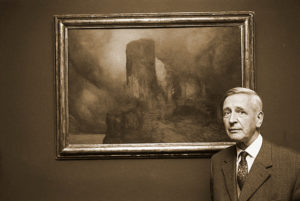The majority of Hitler’s monologues, which are published in this volume, were handed down by Heinrich Heim (pic above). He was born in Munich on 15 June 1900, and grew up in Zweibrücken where he also attended school.
In keeping with his heritage—Heim came from an old and respected Bavarian legal family (his father was a judge at the Bavarian Supreme Court and from 1918 to 1925 a member of the Bavarian State Court and for a time of the Disciplinary Court)—he studied law at the University of Munich.
Heim met Rudolf Hess at an economics college and through him came into contact with the NSDAP, which he joined as early as 19 July 1920. After passing his exams for the higher judicial and administrative service, the young lawyer set up his own practice in Munich. He worked in an office partnership with Dr Hans Frank, who was already Hitler’s and the NSDAP’s preferred legal representative at that time. Heim, too, immediately became active as a lawyer for the party. He primarily represented the interests of the NSDAP’s relief fund, which was headed by Martin Bormann. This established a collaboration that lasted until 1945.
When Rudolf Hess was appointed Deputy Leader in 1933 and Martin Bormann appointed as his chief of staff, the systematic development of an efficient party headquarters began.
Bormann brought Heim onto his staff on 13 August 1933 where he worked, albeit initially on a fee basis without clearly defined responsibilities. Only after the National Socialist party leadership had been given a say in state legislation and namely in the appointment and promotion of civil servants, other lawyers and staff were recruited. In the newly established constitutional law department of the party headquarters, Heim was assigned the handling of all questions concerning the judiciary. He remained in this position of head of the Reich Office until the end of 1939. In 1936 he was appointed senior government councillor, and in 1939 he received the rank of ministerial councillor.
When, at the beginning of the war, Martin Bormann (who had already been in Berlin from time to time and had kept the connection between Hitler and the party leadership) followed the leader of the NSDAP to his respective headquarters, he took Heim with him as his adjutant. He remained in this position from the end of 1939 until the autumn of 1942. After that, when he returned to the Braune Haus in Munich, he headed a newly created department until the end of the war, in which fundamental questions of a reorganisation of Europe were dealt with.
The decisive factor for Heim’s command to the Führer’s headquarters was Hitler’s wish. If possible, he only wanted to see people he knew in his environment.
The fact that Heim was one of his earliest followers (he had the old membership number 1782) also established a special relationship of trust that made him seem suitable to record Hitler’s discussions and explanations. As Bormann’s adjutant, Heim not only ate regularly at Hitler’s table, but he was also frequently invited to the nightly teatimes in the Führer’s bunker, which were attended only by the closest political confidants and the secretaries. The circle was rarely larger than six to eight people. The records of these nocturnal monologues by Hitler make up the special value of Heim’s collection.
In spring 1942, Heim was commissioned to assist the painter Karl Leipold, to whom he was particularly close, in preparing an exhibition at the Haus der Kunst. For the time of his absence from the Führer’s headquarters from March to July 1942, Bormann was looking for a substitute. Since no one was available in the party chancellery, he turned to the Gauleiter of the NSDAP and asked them for suggestions. Among the names he was given was that of Dr Henry Picker, a senior government official. He had been proposed by the Gauleiter of Oldenburg, Karl Rover. The party chancellery made a preliminary selection, and the decision lay with Hitler himself.
Bormann accepted Picker as Heim’s representative because the proposal came from a proven Gauleiter and Hitler transferred the recognition he paid to Picker’s father to his son. Senator Daniel Picker had already promoted the NSDAP in Wilhelmshaven in 1929 and brought its leader into contact with representatives of the shipyard industry and the navy.[1]
During his visits to the port city, Hitler had repeatedly been a guest in the Picker house. For the sake of clarification, it deserves to be stated that Henry Picker did not come to the Führer’s headquarters as a civil servant or lawyer, but served there as Bormann’s adjutant on behalf of the Party Chancellery. His permanent duties therefore included recording Hitler’s conversations during the official lunch and dinner table.
____________
[1] Picker: Hitlers Tischgespräche im Führerhauptquartier (op. cit.), page 12.
